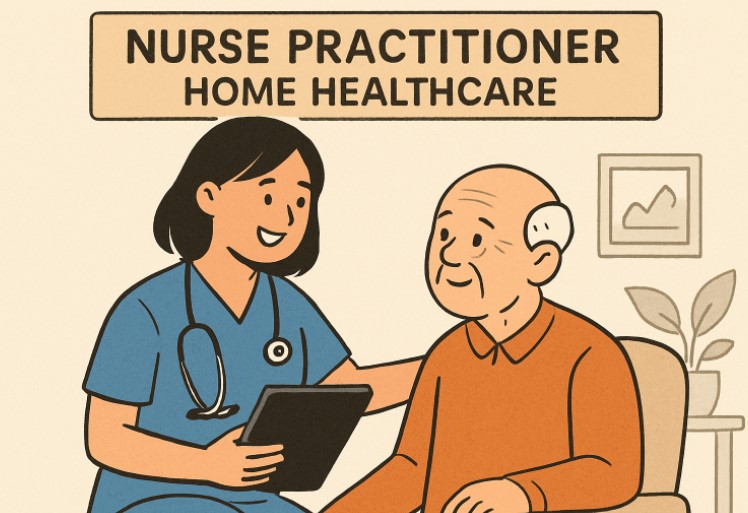Rising Demand for Home-Based Care
As the healthcare needs of the U.S. population rapidly evolve, demand for home-based care continues to surge. An aging population, increased prevalence of chronic conditions, and growing patient preference for in-home support have made home-based healthcare a critical component of our medical system. With nearly 1 in 6 Americans projected to be age 65 or older by 2030, the need for effective, accessible, and high-quality healthcare outside traditional facilities has never been more pressing. Home-based care not only improves comfort for patients but also enables more individualized attention, which can be tailored to complex needs that are often overlooked in traditional clinical settings. For many older adults and individuals with mobility limitations, the ability to receive care at home helps preserve independence, dignity, and overall life satisfaction. Furthermore, the familiarity of the home environment promotes better mental health and reduces stress, which are crucial factors in recovery and long-term wellness.
Simultaneously, job opportunities within this field have dramatically increased. As more healthcare organizations, insurance companies, and government agencies recognize the benefits of home-based care, the need for skilled practitioners—particularly nurse practitioners—has grown substantially. For healthcare professionals eager to make a tangible difference outside hospital walls, there are rewarding opportunities in nurse practitioner jobs near me. These positions offer a unique opportunity to connect deeply with patients while playing a pivotal role in the evolving healthcare landscape. Many NPs find renewed purpose and satisfaction when working in home-based settings, as they can forge trusted relationships, become advocates for their patients’ holistic well-being, and see firsthand the outcomes of their care.
NPs Leading the Charge
Nurse practitioners (NPs) are recognized for their advanced training and clinical independence. With the ability to diagnose conditions, prescribe medications, and devise comprehensive care plans, NPs are uniquely qualified to head home-based care teams, frequently taking charge of the comprehensive management of patient health. Through routine home visits, NPs assess, diagnose, and manage a wide array of medical concerns, ranging from chronic disease management to preventive services. This holistic approach ensures that care plans are customized, practical, and immediately relevant to each patient’s living environment, leading to improved patient outcomes and satisfaction. By spending more time with patients and directly observing their living conditions, NPs can identify potential safety hazards, nutritional needs, and support systems, making a real difference in long-term health.
In addition to clinical expertise, NPs are also strong advocates and educators, helping patients and families understand treatment plans, medication regimens, and self-care techniques. Many nurse practitioners develop care strategies that incorporate patient preferences, cultural values, and lifestyle choices, ensuring treatments are both effective and acceptable. Home-based NPs often collaborate closely with families, caregivers, and other providers, bridging gaps between acute care and long-term wellness at home. By acting as both care coordinators and compassionate health advocates, NPs help prevent hospital readmissions, encourage compliance with medical instructions, and empower patients to take a more active role in their own care journeys.
Technological Advancements Enhancing Home Care
The evolution of telehealth and digital health technologies has revolutionized the delivery of home-based healthcare. Through real-time video visits, secure messaging, and remote monitoring tools, NPs can follow patients’ progress without disruption, providing frequent touchpoints for those who may have mobility or transportation challenges. Digital stethoscopes, portable diagnostic kits, and point-of-care testing devices now allow practitioners to obtain accurate clinical data in real time in a patient’s home, increasing diagnostic precision and responsiveness. Advances in artificial intelligence have further enhanced this process; machine learning algorithms assist in predicting disease exacerbations, monitoring medication adherence, and identifying potential health risks early, optimizing intervention, and reducing hospital readmissions. According to Forbes, AI-enabled platforms now play an increasing role in supporting home care professionals with actionable insights and streamlined workflows.
These integrated technologies also facilitate the sharing of health data among care team members and specialists, resulting in improved coordination and continuity of care. Automated reminders, smart pill dispensers, and wearable devices have empowered patients to take greater control over their health, while simultaneously reducing administrative burdens on practitioners. The result is a patient-centered, data-driven healthcare model that makes high-quality care more accessible, efficient, and responsive than ever before.

Economic Benefits of Home-Based Care
From system-wide and patient perspectives, home-based healthcare delivers substantial financial benefits. By minimizing hospitalizations and emergency room visits, these care models significantly reduce medical expenses and lessen pressure on overcrowded healthcare facilities. For patients with chronic diseases, regular in-home management by NPs can prevent costly complications and unnecessary utilization of acute services. Studies published in the JAMA Network demonstrate that structured home-based interventions result in measurable cost savings, improved health outcomes, and enhanced patient satisfaction. These savings benefit not only individuals and families, but also insurance providers, policymakers, and taxpayers.
NPs who deliver care in the home environment are adept at recognizing early warning signs of illness progression, responding quickly, and intervening before conditions require escalated care. This proactive, preventative approach is not just cost-effective—it improves patients’ quality of life and reduces the emotional and financial burdens associated with recurrent hospital stays. As healthcare systems continue to grapple with rising costs and resource limitations, the expansion of home-based care stands out as a sustainable, high-value solution that meets the complex needs of today’s population.
Challenges and Considerations
Nevertheless, integrating home-based care at scale presents notable hurdles. Maintaining patient safety outside of clinical settings requires rigorous adherence to protocols, careful medication management, and rapid escalation pathways for emergent situations. For some patients, limited social support or lack of access to reliable transportation can hinder follow-up and continuity. Technology integration, regulatory compliance, and data security also remain essential challenges, demanding close coordination among providers, agencies, and technology vendors. Ensuring the privacy and security of patient records requires regular audits and continuous updates to cybersecurity measures.
Building robust partnerships and clearly defined communication channels between healthcare professionals, patients, and caregivers further strengthens home-based care delivery and ensures consistency in high-quality outcomes. Continuous education and training are essential to keep pace with evolving standards and tools, enabling NPs and other professionals to address emerging challenges as they arise. Despite these challenges, the benefits of home-based care—particularly when delivered by skilled nurse practitioners—continue to outweigh the difficulties, leading to more satisfied patients and improved population health.
The Future of Home-Based Healthcare
As policy shifts and payment reforms continue to accelerate the adoption of home-based care, NPs are poised to serve an even greater share of the population in the comfort of their homes. Ongoing professional development, advanced education, and access to the latest health technologies will be essential in equipping nurse practitioners to navigate this complex care environment effectively. Companies, healthcare systems, and policy leaders are increasingly creating new roles and care models that place nurse practitioners at the frontlines of innovation. Their dedication to patient-centered care, combined with the latest digital tools, ensures the promise of home-based healthcare continues to grow stronger—delivering efficient, compassionate solutions to the communities that need them most.
The innovative work being done by nurse practitioners represents the future of healthcare—one where high-quality, accessible care comes directly to your door, and where wellness and independence are prioritized at every stage of life. By adapting swiftly to changing needs and leveraging cutting-edge advances, NPs are shaping a healthcare system that is more responsive, humane, and effective for everyone.







